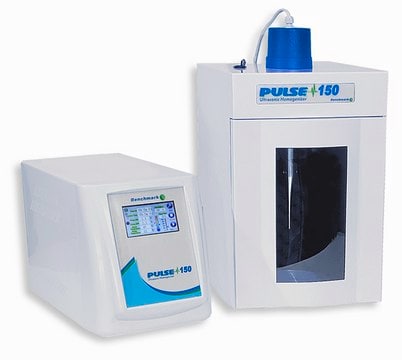Z742683
BeadBug™ 6 microtube homogenizer
AC/DC input 230 V AC, European 2-pin plug
Synonim(y):
Bead homogenizer, Microtube mixer
Zaloguj sięWyświetlanie cen organizacyjnych i kontraktowych
About This Item
Kod UNSPSC:
41121800
NACRES:
NB.74
Polecane produkty
opis
Holds 6 x 2 mL or 2 x 5 mL tubes
producent / nazwa handlowa
Benchmark Scientific D1036-E
Parametry
speed (4.0-7.0) (m/s)
metody
PCR: suitable
szer. × dł. × śr.
8.6 in. (22 cm) × 14 in. (35.5 cm) × 8 in. (20.5 cm)
Szukasz podobnych produktów? Odwiedź Przewodnik dotyczący porównywania produktów
Opis ogólny
Like the other members of the Benchmark Microtube Homogenizer family, the BeadBug 6 utilizes a three dimensional shaking motion to disrupt samples. This motion, when combined with beads of the appropriate size and material, causes high velocity impacts with the sample and is an extremely fast and efficient method for releasing cellular contents, including nucleic acids and proteins.
Many different sample types, from cells in culture to organ tissues and bone can be homogenized in the BeadBug 6, most within 45 seconds. Programming the unit is very simple - just set the speed, time, number of cycles and pause
between cycles, then press start. For convenience, the last programmed parameters remain in memory for repeated runs.
Cycle times can be set between 1 and 90 seconds with pauses between cycles up to 90 seconds in 1 second increments. A maximun of 10 cycles can be set per program.
Sealed tubes prevent cross contamination in the BeadBug 6. Samples are simply loaded into the tubes along with the beads and placed in the unit for processing. After homogenization, tubes are spun briefly in a centrifuge, and
the lysate removed with a pipette.
Designed to fit the needs of medium throughput laboratories, the BeadBug 6 can simultaneously process up to six samples in 2.0ml tubes. With optional adapters, the unit will also accept two 5.0ml tubes. A full range of bead materials and sizes are available in both prefilled tubes and in bulk to meet all your sample processing needs.
Many different sample types, from cells in culture to organ tissues and bone can be homogenized in the BeadBug 6, most within 45 seconds. Programming the unit is very simple - just set the speed, time, number of cycles and pause
between cycles, then press start. For convenience, the last programmed parameters remain in memory for repeated runs.
Cycle times can be set between 1 and 90 seconds with pauses between cycles up to 90 seconds in 1 second increments. A maximun of 10 cycles can be set per program.
Sealed tubes prevent cross contamination in the BeadBug 6. Samples are simply loaded into the tubes along with the beads and placed in the unit for processing. After homogenization, tubes are spun briefly in a centrifuge, and
the lysate removed with a pipette.
Designed to fit the needs of medium throughput laboratories, the BeadBug 6 can simultaneously process up to six samples in 2.0ml tubes. With optional adapters, the unit will also accept two 5.0ml tubes. A full range of bead materials and sizes are available in both prefilled tubes and in bulk to meet all your sample processing needs.
Cechy i korzyści
Fast, efficient bead homogenization
Process up to 6 samples simultaneously
For all sample types, from soft tissue to bone
Accepts 2.0ml or 5.0ml tubes
Full range of bead materials and sizes are available
Process up to 6 samples simultaneously
For all sample types, from soft tissue to bone
Accepts 2.0ml or 5.0ml tubes
Full range of bead materials and sizes are available
Informacje prawne
BeadBug is a trademark of Benchmark Scientific, Inc.
This page may contain text that has been machine translated.
produkt powiązany
Numer produktu
Opis
Cennik
Certyfikaty analizy (CoA)
Poszukaj Certyfikaty analizy (CoA), wpisując numer partii/serii produktów. Numery serii i partii można znaleźć na etykiecie produktu po słowach „seria” lub „partia”.
Masz już ten produkt?
Dokumenty związane z niedawno zakupionymi produktami zostały zamieszczone w Bibliotece dokumentów.
Klienci oglądali również te produkty
Nasz zespół naukowców ma doświadczenie we wszystkich obszarach badań, w tym w naukach przyrodniczych, materiałoznawstwie, syntezie chemicznej, chromatografii, analityce i wielu innych dziedzinach.
Skontaktuj się z zespołem ds. pomocy technicznej






